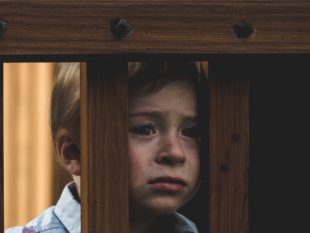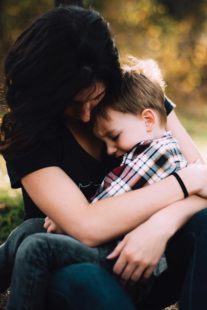One of the great tragedies in any life is the dissolution of what was supposed to be a lifelong journey. Divorce usually marks the death of shared hopes and dreams and is deeply disruptive to everyone involved. There is a scale of life stressors by someone named Rahe; on this list, divorce is rated second, just after the death of a spouse or child.
 The pain and stress of the transition are significant, sometimes enormous, even if the people involved somehow manage to guard against despondency, avoid blame shifting, manage their anger, maintain civility and focus forward toward a more positive “new normal.”
The pain and stress of the transition are significant, sometimes enormous, even if the people involved somehow manage to guard against despondency, avoid blame shifting, manage their anger, maintain civility and focus forward toward a more positive “new normal.”
If neither spouse is immovably spiteful or bitter to the point that they no longer have the capacity to have the children’s best interests at heart then this is a situation where a licensed counselor can make a huge difference in helping the couple manage the emotional currents present in the process. If there are children involved, even more so. If the parents are unable to agree to settle things amicably, their lawyers will end up doing it in court.
Divorce Counseling When Children are Involved
What follows is only intended for couples where there is no abuse involved. If one or both parents are abusive, the divorce probably will not be amicable, and if it is, safety measures need to be in place to protect the children, which is beyond the scope of this article.
If you can’t reach agreement on ground rules, and still want to end the relationship amicably, bring it into the session with a counselor and find a compromise. Having said that, since this process will be deeply distressing and disturbing to the children, it is important to set up your ground rules early.
Agree on the narrative – decide together what you are going to say to your children, what language and how much detail is age appropriate, and make sure your emotions are under control before you have the conversation with them. Sitting with your kids is not the time to lay into your spouse for all the ways that he or she messed up the marriage.
 Choose your time and place – Have the conversation in your home. Make room in your schedule to comfort and reassure them after the conversation. Try very hard not to do it on a school day, or a day when they have something planned.
Choose your time and place – Have the conversation in your home. Make room in your schedule to comfort and reassure them after the conversation. Try very hard not to do it on a school day, or a day when they have something planned.
Let them know you need to have a family meeting and then keep it as brief as possible, allowing for inquiry around their feelings and space for questions, and ask them what they need.
This isn’t about doing some great thing to try and make them feel better. Just be present to them and what they might need. Give them some room to vent anger or tears. Storming off to their room and slamming the door is acceptable. Throwing things is not.
Never use them to deliver messages – even if you perceive your divorce as extremely amicable, don’t use the children as messengers. You the parents created the rift that now makes it more difficult for you to communicate. It is unfair to make the children pay the price for the rift by asking them to ferry information between the two of you.
Never speak ill of your ex – no matter what the narrative, if you blurt out anything negative about your ex-make no mistake – it is self-serving. You might feel better, but your children are left with a stain on their soul that may color how they see the other parent, which only damages them further. Another possibility is that they might decide that you’re vindictive and they don’t want to be around you, which still damages them, and ruins your relationship.
Find a counselor – your child’s feelings about this break up will be deep and felt keenly for years. They will likely be predisposed to somehow feel it is their fault, that they didn’t matter enough that there’s nothing left to hope for, among other emotions.
As an authority outside the family unit, a counselor can highlight these false, damaging beliefs and help children make up a new, more positive and life-affirming narrative for themselves. If they don’t process it now, it will likely become more of a problem later.
Don’t process anything about the divorce or your negative feelings (hurt, sadness, anger) with your child. This is what your therapist is for. When you process your negative feelings with your child, you force them into a peer role or worse a parental role. They will feel responsible for your feelings and end up carrying emotional weight – your emotional weight – that they were never meant to carry.
Don’t cut short the grieving process – Sometimes when we are trying to hold it together, we put a cap on our tears and sadness in an attempt to “soldier on.” This is fine in a crisis when decisions need to be made but lousy as a mode of operation. Let the tears come. When we make no room for our sadness, we have no room for anyone else’s sadness. Your children will need to grieve this breakup. This process is something else a therapist will help with.
Be civil to each other – angry and bitter feelings are often a part of breakups. It sometimes takes effort to hang onto an adult position and not fall prey to splitting, where we structure downward to a younger emotional place and start talking in absolutes. “You never loved anyone in your life!” or “He’s the devil!” and other such declarative statements may feel good at the moment, but it’s a red flag that we’ve stopped operating as an adult.
In an adult position, we can acknowledge the other person is a human being with flaws, a person who out of their own damage may have hurt us, sometimes badly, but if the core of the other person is a wounded child, it’s hard to stay angry at that. Being civil can take tremendous effort at first, but it gets a little easier with practice, and more importantly, it saves us from the spiral death trap of bitterness.
 Guard against escalation – agree that you will both try to catch yourselves when a conversation first becomes an argument. Raise your hand and say, “I fell like this is becoming an argument.” Agree that if you can’t agree and neither is willing to concede, you will pause the discussion and bring it into your next counseling session.
Guard against escalation – agree that you will both try to catch yourselves when a conversation first becomes an argument. Raise your hand and say, “I fell like this is becoming an argument.” Agree that if you can’t agree and neither is willing to concede, you will pause the discussion and bring it into your next counseling session.
Regarding supporting your children, you have to decide what makes sense. Some families where parents are divorced manage to normalize the breakup and process their feelings sufficiently to meet together for birthdays and holidays. For some, the pain of the break up is too great and they have to manage life events in shifts, following rules of shared custody and so forth. Here again, a counselor can help you navigate these sometimes-murky waters.
How Divorce Impacts Children
Each child is different. If it has been bad for a long time, they may seem relieved, a normal reaction to the alleviation of stress. However, any of these (and others) in any intensity or combination may be present, depending on personality and emotional structure:
- They are likely to be inclined to blame themselves for what happened.
- They may feel like their world is collapsing and lose themselves in anger, anxiety or both.
- Their sense of self-worth will take a hit. (I wasn’t worth staying together for)
- They may grow up distrustful of marriage, or of the opposite sex altogether.
- They may despair of ever being happy again.
- They may believe they do not matter to you.
Unexpected Benefits of Divorce Counseling
The unexpected benefits of counseling for children during and after a divorce provide additional stability during the transition and a healthier emotional grid for living their life going forward. With a counselor:
1. A child can be affirmed repeatedly (by a professional outside the family) of the fact that nothing about the breakup is his or her fault. Some children labor for years under the false belief that they are somehow responsible for the break-up. This is a terrible burden to carry and may contribute to later depression and self-image problems. Relieved of this false belief, they are free to transition through and beyond the event, without the residual guilt weighing them down.
2. A child can likewise be affirmed that the breakup is in no way a comment on who they are or their value as a person. Children are often predisposed to feel they are a bad person, either from the common belief that bad things befall bad people, or in conjunction with feelings of guilt. Unpacking this with a counselor can help the child leave all responsibility for the impact of decisions about the breakup where they belong – with the parents.
 3. A child can similarly be affirmed that this is not the end of the world, that they will make it through and figure out how to go forward, and that he or she is not losing the parents, even though the relationship is changing.
3. A child can similarly be affirmed that this is not the end of the world, that they will make it through and figure out how to go forward, and that he or she is not losing the parents, even though the relationship is changing.
Left unchecked, these feelings can escalate leaving the child depressed or despondent and unable to function. Processed properly with a counselor and supported by the actions of the parents, the child can be encouraged that he or she will make it through okay, just like most other people who suffer through the painful transitions of divorce.
4. A child can have a safe place to process feelings, like fear, anger, and sadness that might not otherwise be expressed because the relationships already feel so brittle. A child likely will feel like he or she is on very shaky emotional ground with the parents, possibly like the relationship may be hanging by a thread.
In this state, they likely will feel that they can’t bring negative feelings into the conversation. A counselor provides a safe place for the child to vent anger, rage, fear, and sadness without risking what’s left of the parental relationships. In the long run, this means fewer stuck places of unprocessed emotion that can be triggered, sometimes years later, and bring disruption to their day to day life.
5. Through the gradual normalization of the experience through counseling, the child has the opportunity to accept that this disruption, as painful as it is, is only for a season and that they will all adjust and things will slowly get better.
Believing the transition is only for a season, and then seeing the truth of that lived out, provides a life-long basis for believing the same about other traumatic episodes. This is the essence of resilience, being able to identify that whatever the disruption is, it has a solution, even if that solution is accepting it as a fact and moving forward.
6. By processing this experience with a mental health professional, the child has a much better chance not only of freeing himself or herself from distrust of committed relationships, but also gain tools that will help when the time comes to strengthen and preserve a committed relationship.
The same way that seeing a car accident can make a child never want to drive, seeing a marriage fall apart can sour a child on relationships. This is where the counselor can provide context for healthy separation, owning only what is theirs, not carrying the emotions of others in enmeshed codependency.
Over-responsibility is a crippling condition. It prevents you from standing for your loved ones when they need your strength, steals joy from the relationship and shared events, and generally reduces your enjoyment of life. How much better to have help with this when you are younger, especially if it is likely to be made worse by the trauma of divorce?
If you are moving inexorably toward divorce and have children, seriously consider finding a counselor or therapist to help you and your partner manage the complex mass of emotions that will be a part of it, not only for yourselves but for your children.
The pain and disruption of divorce may be unavoidable, but you can go a long way toward mitigating the long-term emotional effects with the help of a professional counselor or therapist.
“Divorce”, Courtesy ofrawpixel, Unsplash.com, CC0 License; “Sad Child”, Courtesy of Tadeusz Lakota, Unsplash.com, CC0 License; “Despondent”, Courtesy of Yuzki Yuqing Wang, Unsplash.com, CC0 License; “Comfort”, Courtesy of Jordan Whitt, Unsplash.com, CC0 License






